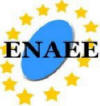“No coherent mechanism to identify student view on quality assurance”
EDINBURGH – Up until now there is no coherent mechanism at European level that identifies the student perception of quality assurance in higher education. With that in mind, intensive discussions and training exercises were carried out in the field of quality assurance (QA) in the European Higher Education Area (EHEA) by more than 30 students from all over Europe, at the occasion of the first QUEST Workshop from 13-16 July in Edinburgh.
ESU’s QUEST project (Quest for Quality for Students) aims at defining a student quality concept and applying and promoting it to empower student led quality vision in member unions and among all educational stakeholders in Europe. The students who participated at the workshop are now part of ESUs’ Quality Assurance Student Experts Pool, established in 2009.
At European level, work on quality assurance is the main tool for building trust between different educational systems with the aim to foster mobility and mutual recognition. On institutional level, it safeguards the quality of the education as a whole, including its environment, processes and outcomes.
An abstract concept
Quality assurance, despite its importance in the higher education sector, is often regarded as a lavishly abstract concept, thus losing focus and power when translated into on the ground practices. It is agreed that students, of all the inquired stakeholders, are most affected by the way quality is understood and assured and enhanced in practice, since quality is -or should be- the milestone of any educational institution.
Even though the student view on quality is of crucial importance to all actors in Higher Education Institutions (HEIs), it is fair to say that up to now there was no coherent mechanism at European level that focuses exclusively on identifying the student perception of quality and that would use the outcomes of this task as precious resources when defining the quality concept. This workshop was just a first step towards this desiderate.
Best practices
Mapping best practices related to quality assurance at programme, institutional and national level by students from 17 European countries was among the activities carried out during the four days of the workshop. This exercise made one more step towards defining the student quality concept. Also, students got the opportunity to update their knowledge regarding European QA policy and to get insight and better understanding of the diverse landscape of the national QA systems.
As one of ESUs’ QUEST project partners, Sparqs (Student participation in quality Scotland) has facilitated sessions that aimed at developing the participants’ quality management skills and multiplication skills. This was also one very important dimension of the workshop since it contributed to building capacity and expertise among ESU QA Student Experts Pool members. In this direction, part of the workshop was dedicated to the development of practical skills needed in review processes and so, students took part into a role play exercise through which a quality enhancement process was simulated.
The next QUEST workshops (to take place in December/ January and September 2012) will continue engaging the student experts in validating research results and in developing a practical handbook and quality toolkit that would enable the student unions to translate the quality concept into practice in a student led way.
By Alina Gavra (ESU QA expert)







